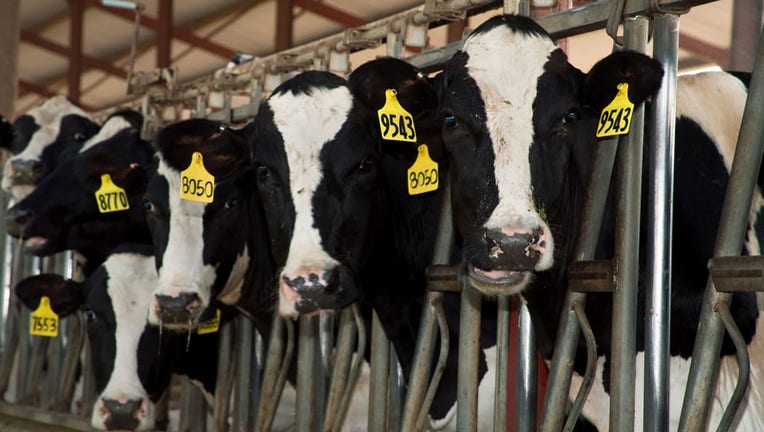Bird flu virus found in milk but FDA says it's safe to drink

FILE - Dairy cows in a stall at a large California dairy farm. (Photo by: Ed Young /Design Pics Editorial/Universal Images Group via Getty Images)
WASHINGTON - Milk is still safe to consume despite evidence of bird flu virus remnants in it, health officials said on Tuesday.
The U.S. Department of Agriculture (USDA), the Food and Drug Administration, and the Centers for Disease Control and Prevention said that the commercial milk supply is still safe for consumers for two reasons:
- The pasteurization process.
- The diversion or destruction of milk from sick cows.
In an advisory update posted to the FDA’s website, the agency noted how "the pasteurization process has served public health well for more than 100 years."
"Pasteurization is a process that kills harmful bacteria and viruses by heating milk to a specific temperature for a set period of time to make milk safer," the FDA advisory said. "Even if a virus is detected in raw milk, pasteurization is generally expected to eliminate pathogens to a level that does not pose a risk to consumer health."
Bird flu virus of "great concern to WHO
According to the CDC, human infections with bird flu viruses can happen when virus gets into a person’s eyes, nose or mouth, or is inhaled. This can happen when virus is in the air (in droplets or possibly dust) and a person breathes it in, or possibly when a person touches something that has virus on it and then touches their mouth, eyes or nose.
The FDA noted that pasteurization is not the same as complete sterilization. Sterilizing milk does extend the shelf life of the product but it isn’t required to ensure milk safety.
"Based on available information, pasteurization is likely to inactivate the virus, however the process is not expected to remove the presence of viral particles," the FDA said.
About 99% of commercial milk in the United States comes from farms that participate in the Grade "A" milk program and follows the Pasteurized Milk Ordinance (PMO), the FDA said.
The PMO ensures the safety of dairy products and this includes the pasteurization and diversion or destruction of milk from sick cows.
In addition to following PMO, the FDA and the CDC are monitoring flu testing data for any unusual trends or flu-like illness, flu or conjunctivitis. So far, these surveillance system has shown no unusual activity.
Which states found bird flu in dairy cows?
Earlier this month, the strain of bird flu that has killed millions of wild birds in recent years was found in at least 26 dairy herds in eight U.S. states: Idaho, Kansas, Michigan, New Mexico, North Carolina, Ohio, Texas and South Dakota.
The virus, known as Type A H5N1, has been detected in a range of mammals over the last few years, but this is the first time it has been found in cattle, according to federal health and animal agencies. Genetic analysis of the virus does not show that it has changed to spread more easily in people, the U.S. Centers for Disease Control and Prevention said.
RELATED: Bird flu outbreak: Are milk and eggs safe?
Can you catch bird flu from eggs or meat?
Only dairy cows, not beef cattle, have been infected or shown signs of illness to date, agriculture officials said.
The largest egg producer in the U.S. temporarily halted operations on April 2 after finding bird flu in its chickens. Cal-Maine Foods culled about 1.6 million laying hens and another 337,000 pullets, or young hens, after the detection.
The company said there was no risk to eggs in the market and that no eggs had been recalled.
Eggs that are handled properly and cooked thoroughly are safe to eat, said Barbara Kowalcyk, director of the Center for Food Safety and Nutrition Security at George Washington University.
"A lot of people like runny eggs. Personally, if I eat an egg, it’s very well cooked," she said
Still, Kowalcyk and others cautioned that the situation could change.
"This is an emerging issue and clearly this pathogen is evolving and there’s a lot that we don’t know," she said. "I do think that everybody is trying to figure it out as quickly as possible."
The Associated Press contributed to this report. This story was reported from Los Angeles.

